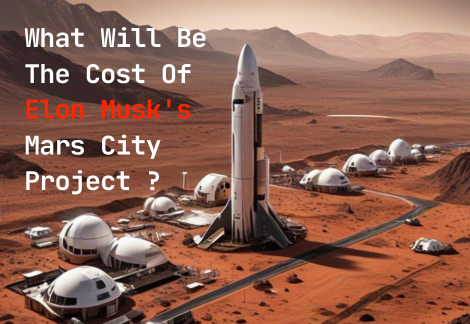What will be the cost of Elon musk’s mars city project ? So the thought that Elon Musk may build a self-sufficient metropolis on Mars has captured the interest of millions of people. Musk, the founder of SpaceX, has frequently presented a grand plan to build a prosperous human colony on the Red Planet. But it will cost an incredible amount of money to make this concept a reality. Musk claims that the final cost of constructing a new Mars city might be anything from $100 billion to more than $100 trillion. These calculations are based on the supposition that building a functioning city would necessitate transferring about a million tons of goods from Earth to Mars.
The Scale of the Challenge
Building a city on Mars is a huge task that requires overcoming many financial, logistical, and technological challenges. One of the main challenge is moving a million tons of cargo. This shipment contains everything from food supplies and scientific equipment to life support systems and building materials. It will take developments in rocket technology, space travel logistics, and renewable energy sources to ensure the safe and effective transportation of these goods.
Breaking Down the Costs
Musk’s lower estimate, of about $100 billion, probably makes the assumption that technology will develop significantly and that space flight will be simplified. This amount might be achievable if the cost of launching reusable rockets, such as SpaceX’s Starship, is significantly reduced, and if in-situ resource utilization (ISRU) methods, such drawing oxygen and water from Martian soil, become practical. In this scenario, using resources and commodities found on Mars itself would keep expenses down.
On the higher end, projections that exceed $100 trillion take into consideration a multitude of factors that may drive up costs. These include the requirement for sophisticated radiation shielding, the building of sturdy homes resistant to the hostile environment of Mars, and the creation of complete life support systems. Furthermore, unanticipated difficulties and the requirement for redundant systems to guarantee the colony’s sustainability and safety would greatly raise the overall cost.
Technological Innovations and Economic Impact
The success of building a financially viable Mars metropolis will depend on multiple technological advancements. Since that each launch now costs tens of millions of dollars, the development of reusable rockets is of utmost importance. With its multiple reuse design, SpaceX’s Starship seeks to significantly reduce these costs. Furthermore, developments in robots and artificial intelligence may be essential for constructing infrastructure and sustaining operations on Mars, thereby saving labor costs and boosting productivity.
The financial implications of establishing a metropolis on Mars go beyond the astronomical calculations. Funding for this kind of endeavor would encourage inventions and technical breakthroughs that have real-world implications. The Mars expedition would spur study and development in fields including materials science, aeronautical engineering, and renewable energy. Furthermore, the emergence of new markets and employment prospects linked to space exploration may promote global economic expansion.
International Collaboration and Funding
It will be essential to collaborate internationally given the enormous financial requirements. The cost of the project might be divided and its viability increased by the pooled resources and experience of several nations. A collaboration of commercial enterprises, foreign partners, and space organizations like as NASA, ESA, and Roscosmos might be formed to divide the financial load and technological obstacles.
A combination of public-private partnerships, private sector donations, and government investment would probably be needed to fund such an initiative. Initiatives for crowdsourcing money, space travel, and the monetization of space resources might all help raise the sums required for this enormous undertaking.
The Vision of a Martian Future
Elon Musk’s vision of a Mars settlement is a risky move for mankind as well as a significant advancement in space research. Even though the projected costs are high, this project has enormous potential for breakthroughs and advantages. In addition to ensuring humanity’s continued existence as a multi-planet species, the establishment of an autonomous metropolis on Mars would serve as an inspiration for future generations.
There are many challenges on the path to Mars, and the cost corresponds with the magnitude of the undertaking. However, the goal of a bustling metropolis on Mars may someday come true with ongoing innovation, global cooperation, and an unwavering pursuit of the remarkable.

